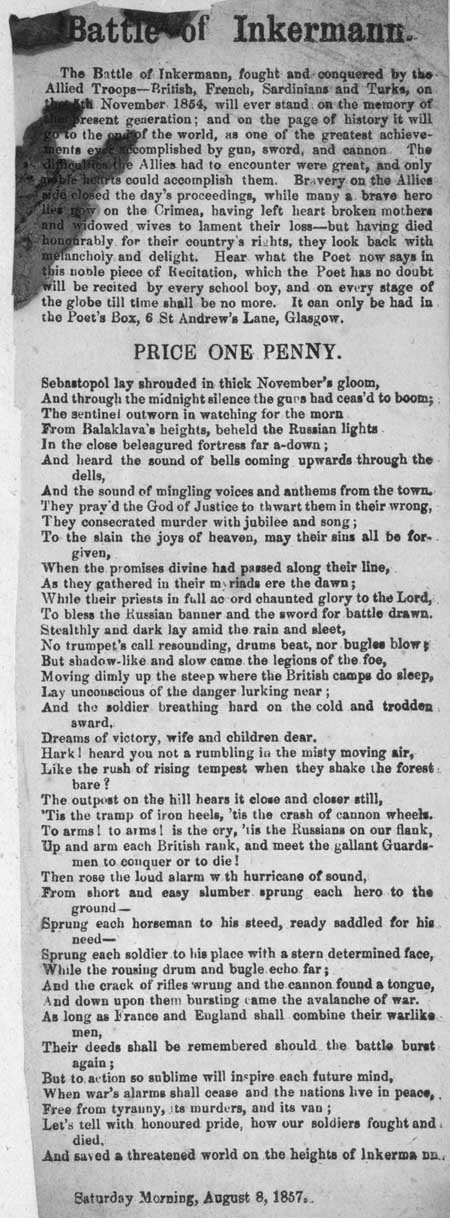Commentary
The introduction to the ballad begins: 'The Battle of Inkermann, fought and conquered by the Allied Troops--British, French, Sardinians and Turks, on the 5th November 1854, will ever stand on the memory of the present generation'. The ballad's first line runs: 'Sebastapol lay shrouded in thick November's gloom'. The sheet was printed almost three years after the battle, by the Poet's Box of Glasgow, and cost one penny. The Crimean War (1853-6) was between Russia and an alliance of Great Britain, France, Sardinia, and the Ottoman (Turkish) Empire. The Battle of Inkermann, or Inkerman as it is sometimes spelt, was one of the decisive events in the war. The French and British defeated the Russians at Inkermann, near Sevastopol. Over 15,000 men lost their lives, 12,000 of them Russians. The much lampooned Scottish poet William McGonagall composed a piece of the same title.
The Poet?s Box in Glasgow operated from 1849 to 1911. Matthew Leitch was the proprietor at 6 St. Andrew Lane?s, a narrow street on the south side of Gallowgate, from 1850 to 1858. His son William Munsie Leitch worked at the same address from 1859 to 1865 and at varous addresses in London Street until 1911. Many of the broadsides published by the Glasgow Poet?s Box were dated and some carried advertisements, not just for printed items but also for shoe blacking and ?soap for lovers?! Like the other ?boxes? in Dundee and Edinburgh, the Glasgow one sold love songs, sea shanties, parodies and dialogues. It is not clear what the connection between the different Poet?s Boxes were. They almost certainly sold each other?s sheets. It is known that John Sanderson in Edinburgh often wrote to the Leitches in Glasgow for songs and that later his brother Charles obtained copies of songs from the Dundee Poet?s Box. There was also a Poet?s Box in Belfast from 1846 to 1856 at the address of the printer James Moore, and one in Paisley in the early 1850s owned by William Anderson.
Broadsides are single sheets of paper, printed on one side, to be read unfolded. They carried public information such as proclamations as well as ballads and news of the day. Cheaply available, they were sold on the streets by pedlars and chapmen. Broadsides offer a valuable insight into many aspects of the society they were published in, and the National Library of Scotland holds over 250,000 of them.
View Transcription | Download PDF Facsimile
|
 |
Date published:
1857 shelfmark: L.C.Fol.70(127a)
 View larger image
View larger image
|


